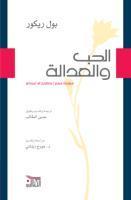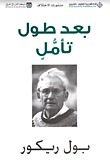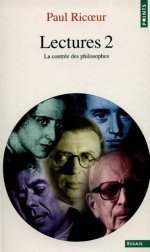
Paul Ricoeur (1913–2005) is widely recognized as one of the most distinguished philosophers of the twentieth century. In the course of his long career he wrote on a broad range of issues. His books include a multi-volume project on the philosophy of the will: Freedom and Nature: The Voluntary and the Involuntary (1950, Eng. tr. 1966), Fallible Man (1960, Eng. tr. 1967), and The Symbolism of Evil (1960, Eng. tr. 1970); a major study of Freud: Freud and Philosophy: An Essay on Interpretation (1965, Eng. tr. 1970); The Rule of Metaphor (1975, Eng. tr. 1977); Interpretation Theory: Discourse and the Surplus of Meaning (1976); the three-volume Time and Narrative (1983-85, Eng. tr. 1984–88); Lectures on Ideology and Utopia (1986); the published version of his Gifford lectures: Oneself as Another (1990, Eng. tr. 1992); Memory, History, Forgetting (2000, Eng. tr. 2004); and The Course of Recognition (2004, Eng. tr. 2005). In addition to his books, Ricoeur published more than 500 essays, many of which appear in collections in English: History and Truth (1955, Eng. tr. 1965); Husserl: An Analysis of His Phenomenology (1967); The Conflict of Interpretations: Essays in Hermeneutics (1969, Eng. tr. 1974); Political and Social Essays (1974); Essays on Biblical Interpretation (1980); Hermeneutics and the Human Sciences (1981); From Text to Action (1986, Eng. tr. 1991); Figuring the Sacred: Religion, Narrative, and Imagination (1995); The Just (1995, Eng. tr. 2000); On Translation (2004, Eng. tr. 2004); and Reflections on the Just (2001, Eng. tr. 2007). The major theme that unites his writings is that of a philosophical anthropology. This anthropology, which Ricoeur came to call an anthropology of the “capable human being,” aims to give an account of the fundamental capabilities and vulnerabilities that human beings display in the activities that make up their lives. Though the accent is always on the possibility of understanding the self as an agent responsible for its actions, Ricoeur consistently rejects any claim that the self is immediately transparent to itself or fully master of itself. Self-knowledge only comes through our relation to the world and our life with and among others in that world. In the course of developing his anthropology, Ricoeur made a major methodological shift. His writings prior to 1960 were in the tradition of existential phenomenology. But during the 1960s Ricoeur concluded that properly to study human reality he had to combine phenomenological description with hermeneutic interpretation. For this hermeneutic phenomenology, whatever is intelligible is accessible to us in and through language and all deployments of language call for interpretation. Accordingly, “there is no self-understanding that is not mediated by signs, symbols, and texts; in the final analysis self-understanding coincides with the interpretation given to these mediating terms” (Oneself as Another, 15, translation corrected). This hermeneutic or linguistic turn did not require him to disavow the basic results of his earlier investigations. It did, however, lead him not only to revisit them but also to see more clearly their implications.
Series
Books

Husserl
An Analysis of His Phenomenology
1967

The Symbolism of Evil
1960

The Conflict of Interpretations
1969

The Just
1995

Being, Essence and Substance in Plato and Aristotle
1982

A Ricoeur Reader
Reflection and Imagination
1991

الحب والعدالة
1997

History and Truth
1955

بعد طول تأمل
2006

The Rule of Metaphor
The Creation of Meaning in Language
1975

Figuring the Sacred
Religion, Narrative & Imagination
1995

Evil
A challenge to philosophy and theology
1993

Interpretation Theory
Discourse and the Surplus of Meaning
1976

Critique and Conviction
Conversations with Francois Azouvi and Marc de Launay
1997

Living Up to Death
2007

Freud and Philosophy
An Essay on Interpretation
1965

Time and Narrative, Volume 1
1983

Lectures on Ideology and Utopia
1986

Memory, History, Forgetting
2000

Time and Narrative, Volume 2
1983

Freedom and Nature
The Voluntary and the Involuntary
1950

Lectures, tome 2
La contrée des philosophes
1999

Hermeneutics and the Human Sciences
Essays on Language, Action and Interpretation
1981

Correspondace - Briefwechsel - Correspondencia
2016

The Reality of the Historical Past
1984

Time and Narrative, Volume 3
1983

Fallible Man
Philosophy of the Will
1960

Oneself as Another
1990

On Translation
1995

The Course of Recognition
2004

From Text to Action
Essays in Hermeneutics, II
1986


